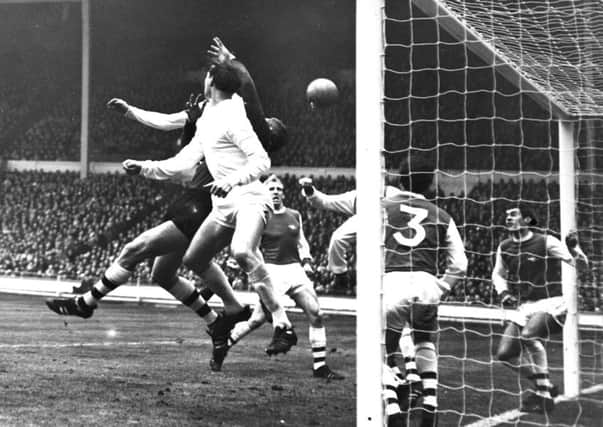1968 League Cup final win carried Leeds United into era among the elite


“We went overnight from being the underdogs to a team that were expected to win every game for the next six or seven years,” says the Scot about the 1968 League Cup final triumph over Arsenal.
Don Revie’s United went into the Wembley showpiece as the nearly men of English football. Six months earlier, the Inter-Cities Fairs Cup final had been lost to Dinamo Zagreb.
Advertisement
Hide AdAdvertisement
Hide AdThrow in defeat to Liverpool in the 1965 FA Cup final, two semi-final losses and two runners-up spots in the league, the first on goal average, and Leeds were desperate to break their silverware duck.
Terry Cooper’s first-half strike would, ultimately, do just that. But not before Revie and assistant Les Cocker had, to defuse nerves in an unusually quiet dressing room, staged an impromptu sports quiz an hour before kick-off.
“We were still a young team back then,” recalls Gray to The Yorkshire Post. “It was still pretty much the boys that Don had brought through.
“Rod Belfitt scored twice in the semi-final against Derby and Jimmy Greenhoff was a big part of the run. Then there was myself, Norman (Hunter), Peter (Lorimer) and all the rest of the boys.”
Advertisement
Hide AdAdvertisement
Hide AdUnited’s winner was, quite literally, a dream come true for Cooper, who on the three previous nights had visualised winning the League Cup during his sleep.
Gray’s curled corner was cleared by George Graham from under his own crossbar, but only as far as Cooper. A knee-high volley from the United left-back did the rest.
Eighteen minutes had elapsed of a final that, unlike the FA Cup showpiece, was not shown live on television due to League secretary Alan Hardaker’s firm belief that broadcasts drove down attendances. It was also staged on a Saturday amid a full league programme.
Cooper’s exquisite strike aside, the viewing public missed little in a dour affair punctuated by flare-ups between two teams who clearly could not stand the sight of each other.
Advertisement
Hide AdAdvertisement
Hide AdFrank McLintock needlessly barging into Gary Sprake after the United goalkeeper had caught a cross sparked one particularly ugly melee that was followed shortly afterwards by the half-time whistle.
As tempers cooled, United’s desire to preserve their lead was made clear by Revie. Widemen Greenhoff and Gray were ordered to sit in front of Paul Reaney and Cooper respectively while Paul Madeley – who had started up front in the place of Cup-tied Mick Jones – was withdrawn into a more defensive role.
Containment was the order of the day and the tactic worked well as Leeds saw out the rest of the game with Sprake called into serious action just once when turning away John Radford’s shot 15 minutes from time.
The final whistle blowing was Billy Bremner’s cue to enjoy a celebratory forward role in the centre circle before joining his elated team-mates and manager.
Advertisement
Hide AdAdvertisement
Hide AdOnly Jack Charlton, as a member of England’s World Cup winning team, and Johnny Giles in Manchester United’s FA Cup triumph of 1963 had previously tasted victory at Wembley so the celebrations went on long into the night.
Gray, then 20 years old, recalls: “The club had never won a major trophy so it was terrific for us to finally break that duck, especially against one of the so-called more established clubs.
“Don always wanted to make Leeds part of the elite and beating Arsenal in a Cup final helped do that.
“From that day on teams started to fear us. Once you have lifted a major trophy the way others look at you changes. We felt more confident to kick-on, too.”
Advertisement
Hide AdAdvertisement
Hide AdJust 15,000 fans welcomed the team home the following afternoon, organisers of the homecoming parade in Leeds having failed to take into account a clash with the highlights of the final being shown on TV.
In an age before video recorders many opted to stay at home and relive United’s first major triumph in the comfort of their own armchairs.
An unhappy Revie made clear such a clash should never be allowed to happen again. The significance of such a notoriously cautious character feeling emboldened enough to suggest publicly that further trophy homecomings lay ahead for his team was lost on no one.
Sure enough, United duly lifted the Fairs Cup, the precursor to the UEFA Cup, the following August with a two-legged victory in the final over Ferencvaros. Then, in April 1969, the League title came to Elland Road for the first time.
Advertisement
Hide AdAdvertisement
Hide Ad“The success that followed all came from that League Cup win,” adds Gray. “Back then the League Cup was a big competition. The club had been so close in the past but, finally, we had a trophy. Any burden felt by the club had been lifted.”